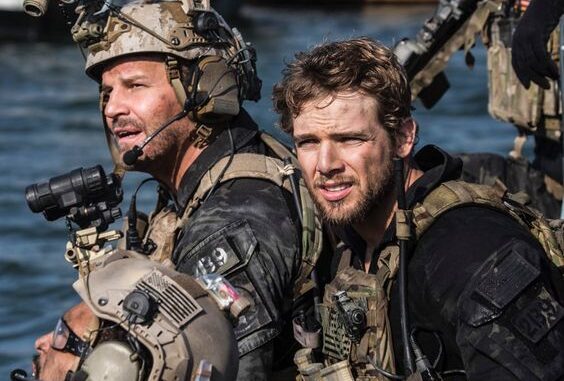
Introduction: The Unexpected Journey of SEAL Team
When SEAL Team first hit our screens, it seemed like another action-packed military show in a sea of similar titles. However, what followed was a journey full of unexpected twists — from near-recasting to an eventual shift to streaming. The show, which follows the elite Bravo Team of Navy SEALs as they tackle dangerous missions and navigate personal struggles, managed to survive despite these major changes. And what’s even more remarkable? SEAL Team didn’t just survive, it thrived — eventually running for 7 seasons, becoming a cornerstone of CBS’s programming, and even helping to birth a new era of military dramas on television. So, how did SEAL Team make it through all the odds to become the beloved show we know today?
In this article, we’ll dive into the surprising journey of SEAL Team, examining the twists and turns that kept it alive, and why its impact on TV and streaming platforms cannot be underestimated.
The Birth of SEAL Team: An Action-Packed Military Drama

SEAL Team premiered in 2017 on CBS, quickly becoming a hit with viewers. With David Boreanaz leading the cast as Jason Hayes, the tough yet emotionally complex leader of Bravo Team, the show was an instant success. What set it apart from other military dramas was its unique combination of heart-pounding action and in-depth character exploration, delving into the psychological toll of being in the military. Fans were drawn to not only the high-intensity missions but also the personal struggles of the team members as they balanced life as soldiers with family life and relationships.
The show’s success quickly established SEAL Team as one of CBS’s major properties, but it wasn’t always smooth sailing.
The Near-Recast That Almost Changed Everything
Every successful show has its hurdles, and SEAL Team was no exception. One of the most dramatic changes the show nearly experienced was a recast. Initially, there was a lot of uncertainty surrounding the future of the lead character, Jason Hayes, portrayed by David Boreanaz. Reports circulated that the show might undergo a major recast, throwing the future of the series into jeopardy.
So, what happened? Fortunately for fans, Boreanaz, who was also well-known for his role in Bones, remained committed to the project. His performance was a key factor in the show’s success, and the network quickly realized that SEAL Team wouldn’t be the same without him. As a result, the recast plans were scrapped, and the show continued on its successful path, keeping the heart of Bravo Team intact.
The Move to Streaming: A Game-Changer for SEAL Team
In an era where streaming services dominate, SEAL Team’s shift from CBS to streaming was a bold move. By Season 6, it became clear that the show had outgrown its traditional broadcast roots. The shift wasn’t just a necessary adaptation; it was a game-changer for the show, opening new opportunities and expanding its audience beyond traditional cable TV.
In 2021, CBS made the decision to move SEAL Team to Paramount+, the network’s streaming platform. This transition signaled a major shift in the way audiences consume TV. Instead of waiting for weekly broadcasts, viewers could now binge entire seasons on-demand, making the show more accessible than ever before.
The move to streaming also allowed the show to explore more mature and complex themes that were previously restricted by broadcast standards. It enabled the writers to delve deeper into the emotional and psychological toll of war and military life, which resonated with long-time fans and newcomers alike.
7 Seasons Later: How SEAL Team Stayed Strong
After the shift to streaming, SEAL Team only grew in popularity, garnering more attention than it had during its CBS broadcast years. The show’s ability to stay fresh and relevant for 7 seasons is a testament to its strong character development, compelling storytelling, and an enduring connection with fans.
A Complex Ensemble Cast That Kept Fans Hooked
One of the reasons SEAL Team remained successful for so long was its ensemble cast. While David Boreanaz was a key figure in the show’s success, the supporting cast was just as important. Characters like Clay Spenser (played by Max Thieriot), Ray Perry (played by Neil Brown Jr.), and Sonny Quinn (played by A.J. Buckley) brought their own unique dynamics to Bravo Team, creating a well-rounded and compelling group.
Each character’s journey was explored in depth, making them more relatable to the audience. Over the years, we saw these characters grow, struggle with personal demons, and evolve in ways that kept us emotionally invested in their stories. This strong ensemble cast helped ensure the show’s longevity, keeping fans engaged even as the series progressed.
The Show’s Focus on Realistic Military Life
What also set SEAL Team apart from other military dramas was its commitment to realism. The show didn’t just focus on the adrenaline-pumping action of military missions; it took a deeper dive into the psychological toll and moral complexities of life in the military. From PTSD to the challenges of balancing family life with a career in the Navy SEALs, the show painted an honest picture of what it means to be a soldier.
By tackling these difficult topics with sensitivity, SEAL Team appealed to a broader audience — not just fans of military action, but also those interested in exploring the human side of soldiers’ lives.
The Birth of a CBS Franchise: How SEAL Team Sparked a New Era
SEAL Team didn’t just survive for 7 seasons; it also helped launch a new wave of military dramas on CBS. The show’s success has paved the way for other military-themed series, both on broadcast and streaming platforms. CBS recognized the potential of this genre, and SEAL Team was at the forefront of this shift.
With its success, the SEAL Team franchise began to expand. CBS launched other related series and even started producing spin-offs that were influenced by the same themes of brotherhood, sacrifice, and combat. The success of SEAL Team has created a lasting impact on CBS’s programming strategy, establishing a foundation for more military-themed content in the future.
The Show’s Impact on Fans and Culture
Beyond its impact on television, SEAL Team has had a profound influence on fans and popular culture. The show’s portrayal of military life resonated with veterans, active service members, and civilians alike. Many viewers praised the show for bringing attention to the mental and emotional challenges that soldiers face when returning home.
The characters of SEAL Team also became cultural icons, inspiring loyalty and admiration from their fans. The show’s messages of teamwork, resilience, and sacrifice struck a chord, fostering a strong community of viewers who supported the show throughout its run.
Conclusion: SEAL Team’s Legacy – A Finale That Leaves Us Wanting More
As SEAL Team approaches its final season, it’s clear that the show has left an undeniable mark on television. From its humble beginnings on CBS to its eventual shift to streaming, the show’s ability to adapt to changing times while maintaining its core values of action, drama, and emotional depth is what has kept it going for 7 successful seasons. The show’s legacy is one of resilience, both for the characters it portrays and for the series itself.
Though the show may be ending, the impact of SEAL Team on TV and pop culture will continue to be felt. And who knows? The door is always open for more stories in the world of Bravo Team. With such a devoted fanbase and a rich universe to explore, we may not have seen the last of SEAL Team just yet.
FAQs:
1. Will SEAL Team return for a spin-off or movie?
While no official announcements have been made, the potential for a spin-off or movie is high given the show’s success and fanbase.
2. How did the shift to streaming affect SEAL Team?
The streaming shift allowed the show to explore more mature themes and gave it a wider audience, which led to even greater success.
3. Why was SEAL Team almost recast?
There were initial concerns about the future of David Boreanaz’s character, Jason Hayes, but the plans for a recast were eventually dropped due to his popularity and commitment to the show.
4. What made SEAL Team stand out from other military dramas?
The show’s realistic portrayal of military life, coupled with deep emotional and psychological storylines, set it apart from others in the genre.